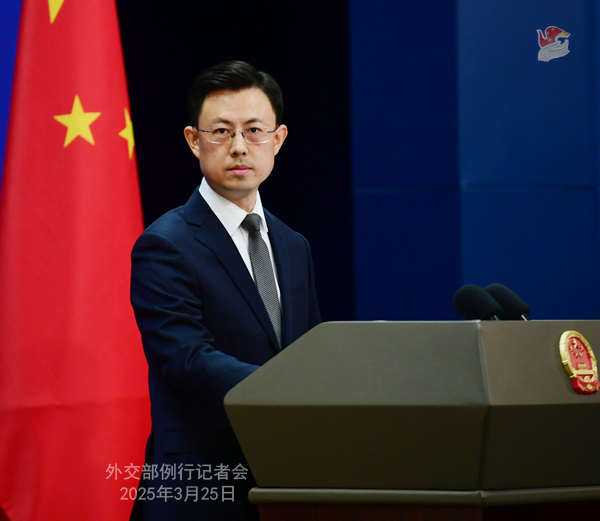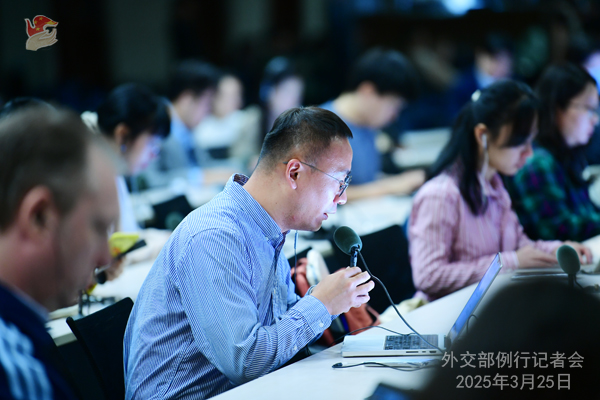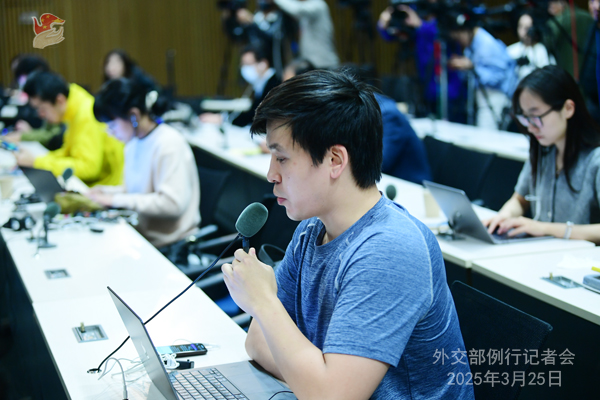
Hubei Media Group: The China Development Forum 2025 was held in Beijing. The theme of this year’s forum is “Unleashing Development Momentum for Stable Growth of Global Economy.” Political figures from many countries and heads of multinationals attended the forum. What’s your comment?
Guo Jiakun: From March 23 to 24, the China Development Forum 2025 was held in Beijing. Premier of the State Council Li Qiang attended the opening ceremony and delivered a keynote speech. He encouraged all parties to feel China’s vibrancy through its economic growth during the Spring Festival, understand China’s economic policies through the two sessions, and think about the right way to world development and progress through the evolving global landscape. His speech shows China’s confidence and resolve in continuing the good momentum of steady economic growth as well as its commitment to acting as a force of stability and certainty for world peace and development.
This year’s forum is attended by over 750 foreign representatives, including global companies from a larger number of countries covering more sectors. Among these multinationals, the first-time attendees outnumber the previous years. All these show that foreign-invested businesses continue to invest in China with optimism, which is a vote of confidence in China’s economic outlook.
China will steadfastly advance high-quality development and high-standard opening up. We welcome foreign businesses to seize opportunities, invest in China, prepare for the future, promote steady global growth, oppose unilateralism and protectionism, and achieve greater development through mutually beneficial cooperation.
AFP: Canada has launched a dispute against China at the WTO over additional duties on agricultural and fishery products. What is the Foreign Ministry’s response to this?
Guo Jiakun: I’d refer you to competent Chinese authorities for the specific question. I want to point out that, in disregard of China’s repeated persuasion, Canada has insisted on taking discriminatory restrictive measures on some Chinese imports. This seriously violates WTO rules, disrupts normal trade order, and gravely harms China’s lawful rights and interests. The countermeasures China has taken are fully necessary, justified, reasonable and lawful. China urges Canada to take concrete steps to correct the wrongdoings, and provide a fair, non-discriminatory and predictable environment for the normal trade and cooperation between the businesses of the two countries.

Reuters: U.S. President Donald Trump on Monday issued an executive order declaring that any country buying oil or gas from Venezuela will pay a 25 percent tariff on trades with the U.S. China is the biggest buyer of Venezuela’s oil. Will China stop its oil purchases from Venezuela to comply with Trump’s order?
Guo Jiakun: The U.S. has long abused illegal unilateral sanctions and “long-arm jurisdiction,” and grossly interfered in the internal affairs of other countries. China firmly opposes such actions. We urge the U.S. to cease its interference in Venezuela’s internal affairs, lift its illegal unilateral sanctions against Venezuela, and take steps that contribute to peace, stability, and development in Venezuela and beyond. Trade wars and tariff wars have no winners. Imposing additional tariffs will only inflict greater losses on American businesses and consumers.
Beijing Daily: We noted that, at a symposium held by China, UN Under Secretary General Guy Ryder stressed China’s important role in supporting multilateralism and the UN. Can you share more with us on this?
Guo Jiakun: On March 24, the Ministry of Foreign Affairs held the international symposium themed “Strengthen the Role of the United Nations and Promote Multilateralism” in Beijing. Member of the Political Bureau of the CPC Central Committee and Foreign Minister Wang Yi delivered a written message.
He noted that, the successful convening of the UN Summit of the Future reflects the common aspiration of the international community for supporting and promoting multilateralism, strengthening the role of the UN and improving global governance. This year marks the 80th anniversary of the victory in the World Anti-Fascist War and the founding of the United Nations. The international community hopes to see all countries work in solidarity and coordination to uphold what is right, steer the direction of our era, defend fairness and justice, safeguard world peace and stability, and promote global development and prosperity. As a founding member of the United Nations and a permanent member of the Security Council, China will continue to work with all sides to practice true multilateralism, safeguard the central role of the UN, and promote global governance that is based on extensive consultation, joint contribution and shared benefit. Together, we will bring stability to a changing and turbulent world, inject positive energy in building a more just and equitable global governance system.
Under Secretary General of the UN Guy Ryder attended upon invitation and addressed the symposium. Assistant Foreign Minister Miao Deyu attended and addressed the opening and closing ceremony of the symposium. The participating representatives engaged in lively discussions on topics including sustainable development, international peace and security, scientific and technological innovation, digital cooperation, as well as youth and future generations. There was a broad consensus that, under the current circumstances, it is imperative to strengthen the role of the UN, reinvigorate multilateralism, and foster solidarity and cooperation to jointly address global challenges. The representatives also commended China’s active and constructive role in this regard.
Reuters: The Chinese staff at Mintz Group have been released, according to the company today. Was there a probe into them and Mintz? What is China’s conclusion on the case?
Guo Jiakun: I’d refer you to competent authorities for anything specific.

China News Service: It’s reported the Philippine Ambassador to the United States, Jose Manuel Romualdez, stated that the U.S. Secretary of Defense Pete Hegseth is scheduled to visit the Philippines on March 28 to 29. During the visit, Secretary Hegseth is expected to meet with the Philippine President and Secretary of Defense. This visit underscores the solid alliance between the Philippines and the United States, and highlights Philippines’ role in U.S. defense strategy. He noted that the Philippines seeks to benefit from its allies, including the U.S., Japan, and Australia, particularly in modernizing its military capabilities, so as to be better prepared should there be conflicts in the Indo-Pacific region. What is China’s response?
Guo Jiakun: On the military cooperation between the Philippines and the U.S., China made clear its position more than once. Any defense or security cooperation between the Philippines and other countries should not target any third party or harm their interest, still less threaten regional peace or escalate tensions in the region. Facts have repeatedly proven that nothing good could come out of opening the door to a predator. Those who willingly serve as chess pieces will be deserted in the end. Our message to some in the Philippines: stop serving as other countries’ mouthpiece and no more stunt for personal political agenda.
Global Times: The China Cybersecurity Industry Alliance released today a report entitled Mobile Cyberattacks Conducted by U.S. Intelligence Agencies, revealing how the U.S. carried out cyberattacks and eavesdropping and espionage activities on global mobile smart terminals, supply chain and operators. What is China’s comment?
Guo Jiakun: We noted the report. According to this report, the U.S. government has taken advantage of its monopoly in telecommunication technology and in the upstream of the industrial and supply chains, and carried out large-scale and long-term malicious cyber activities targeting mobile phones and even the entire mobile industry ecosystem globally. Such activities have been pervasive.
Let me point out that according to the report, the U.S. is the major country that carries out cyberattacks through the supply chain and mobile operators. Over the years, the U.S. has blamed others on the security of the supply chain, applied double standards, and tried every means possible to peddle the so-called security issues in 5G supply chain. At the same time, however, it has set up backdoors in telecommunication equipment and products worldwide with the help of major U.S. internet companies or suppliers to support its cyberattacks. We believe this report will help the world have a better understanding of what the U.S. has done in this field.
We express grave concern over the malicious cyber activities by the U.S. as revealed by the report. We urge the U.S. to stop such activities at once, in particular the malicious cyber activities carried out through the global supply chain. The U.S. should give an explanation to the world in a responsible attitude.
Reuters: The Canadian Security Intelligence Service said on Monday that China and India are likely to try to interfere in the upcoming Canadian general election on April 28. The Canadian spy service also said China is “highly likely” to use AI-enabled tools to interfere in that election. What will China do to address Canada’s fears?
Guo Jiakun: China stays committed to the principle of non-interference in other countries’ domestic affairs. China has never interfered in Canada’s internal affairs, nor do we have any interest in doing so.
Reuters: Bangladesh’s Chief Adviser Muhammad Yunus will start his China visit on Wednesday. What are China’s expectations for the visit?
Guo Jiakun: Yesterday, the Boao Forum for Asia (BFA) announced that Chief Adviser Yunus is going to attend the BFA Annual Conference 2025. China welcomes Chief Adviser Yunus’s attendance at the conference in China. Let me stress that China and Bangladesh are traditional friends and neighbors as well as comprehensive strategic cooperative partners. This year marks the 50th anniversary of our diplomatic ties. China stands ready to work with Bangladesh to step up exchanges and cooperation and jointly move forward bilateral relations.